
Transcription
Daniel Gwynn Blog Update
Subject: "Open Season"
Date: 2/20/14
If you've been keeping an eye on the headlines, you may have been shocked by the many reports of murder, assaults, revelations of wrongful convictions, and botched executions. It's been open season on minorities, especially black Americans (Jordan Davis, Trayvon Martin, Antonio Yarbough, Central Park Five, West Memphis Three). The criminal justice system has systematically depleted black America's population through mass incarceration, disenfranchisement, and murder.
The prisons in Pennsylvania are bursting at the seams with minorities serving disproportionate drug sentences that has finally been revised after 30 years of overreaching. Then there's minorities serving time for crimes they didn't commit because it seems the prosecutors has withheld some pertinent information that proved the convicted to be innocent. Next, you have the police shooting unarmed suspects and beating the crap out of restrained suspects and getting away with it. Then you have racist murders claiming self-defense after they had initiated the deadly encounter resulting in them getting away with murdering an unarmed black teen.
The Jordan Davis murder trial really hurt my heart because they let that man get away with murder. All Michael Dunn did was claim to have perceived a threat and, instead of calling the police, he opened fire then claimed self-defense. If a black person would've tried to claim something like that, they would've been thrown into prison. This man fired ten rounds of heat into a car load of teenagers. And when he was done, he put the gun back into the glove compartment. When his fiancée returned to the car, he said nothing about the perceived threat or what happened. He drove to the hotel and ordered a pizza. The next day, he sees the report on the shooting, hears that someone was dead, and drove home still not contacting the police.
The police never learned of the possibility of the victim having a gun until the police arrested and interviewed DUnn. No gun or any corroboration evidence of a gun was ever found.
Daniel Gwynn
Other posts by this author
|
2017 may 13

|
2017 apr 22
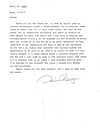
|
2017 apr 22
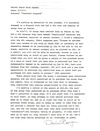
|
2017 apr 22

|
2017 apr 1
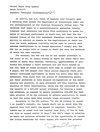
|
2017 apr 1
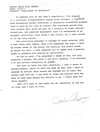
|
More... |
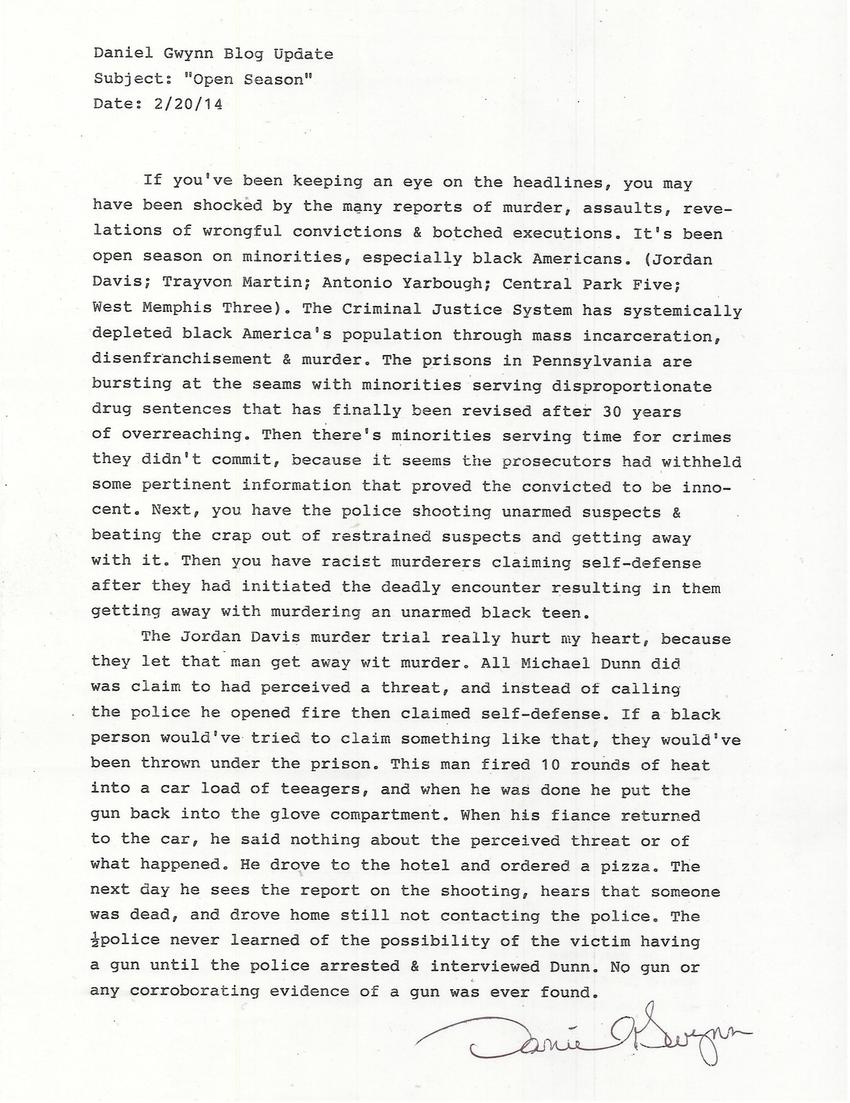

Replies (9)
In the 503 days between the shooting of Trayvon Martin and the Zimmerman verdict 10,865 blacks were murdered by other blacks. Can you name one? Can Al Sharpton or Jesse (Baby Daddy) Jackson? 7000 black people are killed every year. 94% by other black people. If you are to get angry you need to focus on the real problem of Black on Black homicide.
In your home state you are more likely to die by homicide in the seven square miles of Wilkes-Barre, of gunshot, than in major cities like New York, Philadelphia, Pittsburgh or Chicago (where a dozen people were killed and at least 62 wounded in gun violence over the Fourth of July holiday weekend. It is alright to feel pain but at least be consistent and don't let race-baiters control the narrative.
Paul.
The fact that 72% of black children are born to single mothers is a major concern. Dropping out of high school bars that person from 90% of jobs. This is equally true for all races with Hispanics having the largest percentage of dropouts by far and Asians the least. With manufacturing jobs decreasing all the time it leaves minimum wage service jobs or crime. 75% of crime is committed by high school dropouts.
Staying in high school till graduation, having children only when they can afford to support them and having them in a family unit of mother/father would go a long way to improving prospects.
Since I know you don't have direct access to the internet I am including a text on Willie Lynch's Letter from the Jim Crow Museum of Racist Memorabilia at Ferris State University. It is authored by William Jelani Cobb. He is Associate Professor of History and Director of the Institute for African American Studies at University of Connecticut in Storrs, CT. Cobb specializes in post-Civil War African-American history. I trust you will find it interesting.
Paul
May 2004
Q: Is Willie Lynch's letter real? If it is real it is one of the most important documents related to African Americans.
-- Gloria Jenkins, Big Sandy, Texas
A: There are many problems with this document - not the least of which is the fact that it is absolutely fake.
I long ago stopped listening to sentences that begin with "The problem with black people is," or end with "and that's why black people can't get ahead now," which partly explains my initial indifference to the now-famous William Lynch Speech.
In the few years since the speech on how to train slaves first appeared, it has been cited by countless college students and a black member of the House of Representatives, along the way becoming the essential verbal footnote in barbershop analysis of what's wrong with black people. The rapper Talib Kweli laments on the song "Know That," "blacks are dyin'/how to make a slave/by Willie Lynch is still applyin'," and one professor at a Midwestern university made the speech required reading for her class. Of late, the frequency of its citations seems to be increasing - at least three people have asked me about it in the last month.
According to the speech's preface, Master Lynch was concerned enough with the fortunes of his slave-holding brethren in the American colonies to present a lecture on the bank of the James River, explaining how to keep unruly servants disunited. The old, he argued, should be pitted against the young, the dark against the light, the male against the female and so on. Such disunifying tactics "will control the slaves for at least 300 years," he guaranteed. And that, it seems, is why black people can't get ahead now.
As a historian, I am generally skeptical of smoking guns. Historical work, like forensic science, isn't some flashy field - it depends on the painstaking aggregation of facts that lead researchers to the most likely explanation, but rarely the only one. Slavery was an incredibly complex set of social, economic and legal relations that literally boiled down to black and white. But given the variation in size of farms, number of enslaved workers, region, crops grown, law, gender-ratios, religion and local economy, it is unlikely that a single letter could explain slave policy for at least 151 years of the institution and its ramifications down to the present day.
Considering the limited number of extant sources from 18th century, if this speech had been "discovered," it would've been the subject of incessant historical panels, scholarly articles and debates. It would literally be a career-making find. But the letter was never "discovered." Rather, it simply "appeared" on the Internet - bypassing the official historical circuits and making its way directly into the canon of American racial conspiratoria.
Two paragraphs later he says that he will "give an outline of action," for slave-holders; the word "out-line" had appeared only 50 years earlier and at that time was only used as an artistic term meaning a sketch - it didn't convey its present meaning until 1759. Even more damning is his use of the terms "indoctrination" and "self-refueling" in the next sentence. The first word didn't carry its current connotation until 1832; the second didn't even enter the language until 1811 - a century after the purported date of Lynch's speech. More obviously, Lynch uses the word "Black," with an upper-case "B," to describe African Americans more than two centuries before the word came to be applied as a common ethnic identifier.
In some popular citations, Lynch has also been - inexplicably - credited with the term "lynching," which would be odd since the speech promises to provide slave-holders with non-violent techniques that will save them the expense of killing valuable, if unruly, property. This inaccuracy points to a more basic problem in understanding American history: the violence directed at black people in America was exceptional in the regard that it was racialized and used to reinforce political and social subordination, but it was not unique.
Given the sparse judicial resources (judges were forced to travel from town-to-town hearing cases, which is where we get the term "judicial circuit") and the frequency of property crimes in the early republic, lynching was often seen as a form of community justice. Not until the 1880s, after the end of Reconstruction, did "lynching" become associated with African Americans; gradually the number of blacks lynched each year surpassed the number of whites until it became almost exclusively directed at black people late in the century. (Nevertheless, between 1882 and 1944, Tuskegee University recorded 3,417 lynchings with black victims -- and 1,291 lynchings with white ones.)
The Willie Lynch speech would seem to give a quick-and-easy explanation of the roots of our much-lamented "black disunity." You could make similar arguments about the lingering effects of a real historical document like the 1845 tract, "Religious Instruction of Negroes" - written by a proslavery Presbyterian minister - or the British practice of mixing different African ethnicities on slave ships in order to make communication - and therefore rebellion - more difficult. But this too is questionable - it presumes that whites, or any other diverse group, do not face divisive gender issues, generation gaps and class distinctions. Willie Lynch offers no explanation for the white pro-lifer who guns down a white abortion-provider or white-on-white domestic violence. He does not explain political conflicts among different Latino groups or crime in Asian communities. Unity is not the same as unanimity and in the end, black people are no more disunited than any other group of people - and a lot more united than we give ourselves credit for.
May 2004 response by William Jelani Cobb
Quoting a 16 year old report to support your reasoning clearly shows that recent reports don't uphold your position.
Look at these statistics............Black men are 8 times more likely to be the victim of homicide in Philly than white men. 90% of the black men that die are going to be killed by other black men. White men are 50 times more likely to be attacked by black men than black men being attacked by whites. And don't even think of the statistics in Wilkes Barre. There needs to be drastic change and it most certainly begins at home.
It would have been interesting if we could engage in a discussion about this but unfortunately there seems no chance of anything I say being taken on board.
Take care of yourself Daniel
Paul